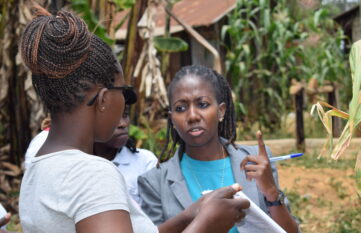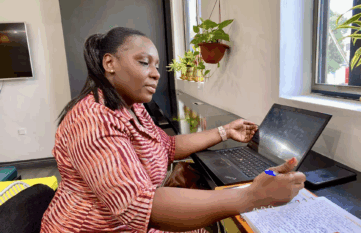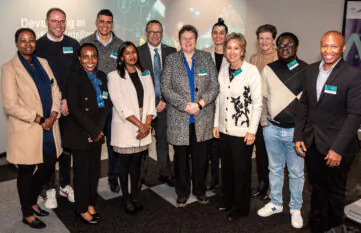In rural India, millions of women remain disconnected from critical information: from health advice and climate resilience tips, to understanding their gender rights. Low literacy levels, linguistic diversity, and limited internet connectivity make it difficult for them to access the knowledge they need. Now, innovative approaches using artificial intelligence are opening new doors—with powerful results.
Lakshmi (name changed), 34, lives in a village near Warangal, in the Indian state of Telangana. For months, she noticed pale, numb patches on her arm and tingling in her fingers, but stigma and unreadable clinic leaflets kept her from seeking help.
That changed during a meeting of her women’s savings group, when a community health worker scanned a QR code and played an Audiopedia audio lesson in Telugu, Lakshmi’s native language. It explained how to recognise early signs of leprosy, that free diagnosis and treatment are available at government facilities, and how simple self-care can prevent disability.
The following day, she visited her local health centre and started treatment. For Lakshmi, the audio lesson was the key to accessing medical care, illustrating the ‘last-mile’ challenge: life-saving knowledge often exists, but not in the language, format or channel people can access and understand.

Bridging the digital gap through Audiopedia Foundation
The Audiopedia Foundation, a non-profit, is dedicated to making essential knowledge universally available. It leverages digital audio technology to empower marginalised communities around the world. Its innovative and inclusive approach has earned international recognition, notably being selected into the United Nations SDG Digital Acceleration Agenda for advancing gender equality, the fifth of the 17 Sustainable Development Goals.
Audiopedia Bharat now uses artificial intelligence (AI) to deliver even more easily accessible audio content about a variety of topics. It is developed by the BMZ initiative FAIR Forward – Artificial Intelligence for All in collaboration with the Audiopedia Foundation and has been acknowledged as a Digital Public Good.
Accessible, impactful, and community-driven: Audiopedia Bharat
Audiopedia Bharat offers easy to understand and reliable information on diverse topics, ranging from women’s health, water management, to agriculture, and business advice. It is designed to work with the devices and tools people already have. Women can easily access the audio content available in multiple Indian languages through different low-tech and offline ways: using mobile phones, loudspeakers, WhatsApp sharing, or QR-coded posters displayed in public spaces. The audio files only need to be downloaded once, for example in community centres equipped with an internet connection. They can be saved on a mobile phone or SD card to be played on any SD-ready device, such as simple feature phones. This approach guarantees access to knowledge irrespective of literacy, language proficiency, or internet availability.
Audiopedia’s open digital platform and permissive licensing allows local organisations to share, adapt and re-use content within their communities and beyond. This community-driven approach fosters trust, strengthens local ownership and ensures that the right content matches the right audience.
Inclusive AI: the core of Audiopedia Bharat
Audiopedia Bharat uses AI-driven machine translation and text-to-speech capabilities to create culturally relevant and linguistically precise audio resources in multiple Indian languages. The audio messages are generated in languages that were previously underrepresented in Ai development. In order to make applications more inclusive, large amounts of language data have been collected, which are now openly available for further use.
Partners like the Digital India Bhashini Division under the Ministry of Electronics and IT (MeitY) and the Indian Institute of Science (IISc) help to ensure the quality and cultural appropriateness of the translated content. By combining cutting-edge technology with local expertise, Audiopedia Bharat can even reach women who are unable to read or write to narrow the significant knowledge gap that persists in underserved rural areas.
Early impact: women gaining agency
With Audiopedia Bharat women across multiple communities can benefit from critical information on maternal and child health, climate resilience, and women’s rights, enabling them to make more informed decisions and improve their daily lives.

© Audiopedia Foundation
Inclusive AI is a powerful tool for bridging digital divides. Our collaboration with FAIR Forward and Bhashini enables us to ensure that critical knowledge reaches women who need it most, empowering them to transform their own lives. This initiative exemplifies the extraordinary potential of AI when deployed thoughtfully and inclusively.
Marcel Heyne, Director, Audiopedia Foundation
By combing AI innovation with community engagement and cultural relevance, Audiopedia Bharat and FAIR Forward in collaboration with India’s Bhashini initiative prove that technology can foster inclusion and become a tool of genuine empowerment for even the most marginalised communities—turning access to knowledge into real-world impact.




